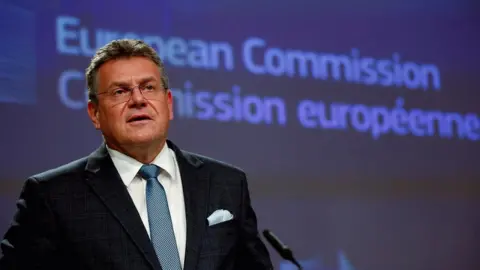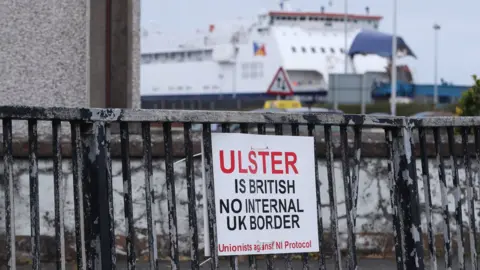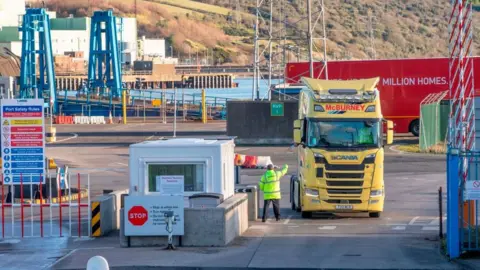Brexit: EU chief urges UK to be honest over NI Protocol
 JOHANNA GERON/Reuters
JOHANNA GERON/ReutersThe EU's chief negotiator has urged the UK to "dial down the rhetoric" on the Northern Ireland Protocol.
It comes after UK ministers refused to rule out legislation to override the protocol in UK law.
Maros Sefcovic said the UK needed to "be honest" about what it had committed to in the protocol.
Northern Irish business groups are understood to be working on a plan to encourage political parties to reach a consensus position on the protocol.
They hope that a common position could bring new momentum to talks between the EU and UK.
The plan is in its early stages and there is no guarantee that it will succeed.
The protocol is a special Brexit deal for Northern Ireland designed to prevent the return of a hard land border with the Republic of Ireland.
It was agreed between the UK government and the EU in 2019, put into domestic law by the UK Parliament and came into force in January 2021.
 Getty Images
Getty ImagesIt works by keeping Northern Ireland inside the EU's single market for goods.
This means Northern Ireland continues to follow some EU laws and there are new checks and paperwork for certain goods which are imported into Northern Ireland from the rest of the UK.
Unionist parties say this undermine Northern Ireland's position in the UK.
On Sunday, the deputy prime minister said nothing was off the table in the UK's attempt to "fix" the Northern Ireland Protocol.
Dominic Raab told the BBC the protocol was an "obstacle to stability" in the country.
He added that the EU has proposed "durable solutions" to improve the operation of the deal.
However the largest unionist party, the DUP, says it may prevent the creation of a new executive in Northern Ireland until protocol issues are resolved to its satisfaction.
The Northern Ireland Assembly elections cemented a majority for parties which accept the protocol.
The UK government has accused the EU of applying the protocol too rigidly, while Brussels accepts it is causing difficulties for businesses and has proposed a package of measures to reduce its practical impacts.
The BBC understands the government will signal its willingness to change the law on the protocol in Tuesday's Queen's Speech, without committing to do so immediately.
 PA Media
PA MediaMr Sefcovic said the UK should "show genuine determination and good faith to make the protocol work, rather than looking for ways to erode it".
He added that the EU has "an unshakeable and longstanding commitment to peace, stability and prosperity in Northern Ireland".
"It has absolutely no interest in interfering in the UK's internal affairs."
Mr Sefcovic said the UK should "show genuine determination and good faith to make the protocol work, rather than looking for ways to erode it".
He added that the EU has "an unshakeable and longstanding commitment to peace, stability and prosperity in Northern Ireland".
"It has absolutely no interest in interfering in the UK's internal affairs."
Since October, the UK and EU have been engaged in technical negotiations on the protocol but there has been little tangible progress.
The EU has recently changed its laws to guarantee the supply of medicines from Great Britain to Northern Ireland.
The two sides broadly agree that other goods from Great Britain which are staying in Northern Ireland should be treated with a lighter touch than those which are moving on to the Republic of Ireland and the wider EU.
However there is no agreement on how this should work in practice.
The protocol is not currently being fully implemented as originally negotiated due to "grace periods".
 Getty Images
Getty ImagesThe position of business groups is broadly that the protocol should ultimately be at least no more onerous than the current grace periods - it is around this in particular that they are trying to build consensus.
Making grace periods permanent would require further movement from the EU.
The business groups hope that a consensus on what outcomes the protocol should produce would be difficult to ignore.
Although the NI parties have sharply different views on Brexit and the protocol there have been joint statements in the past.
In August 2016, the then first and deputy first ministers, Arlene Foster and Martin McGuinness, wrote to the prime minister with agreed priorities for NI in the Brexit negotiations.
In November 2020, the then first and deputy first ministers, Arlene Foster and Michelle O'Neill, wrote to the European Commission around concerns that the planned introduction of checks would damage supermarket supply chains
